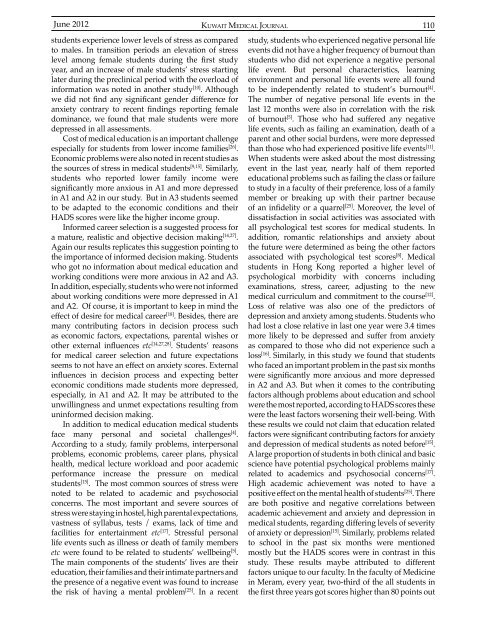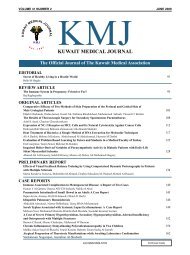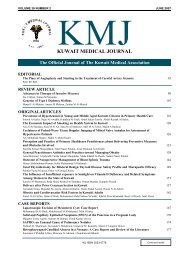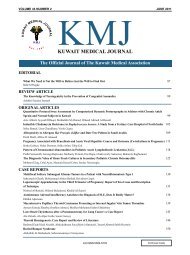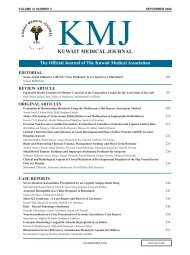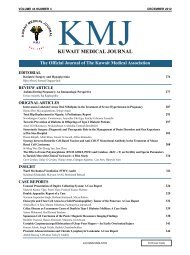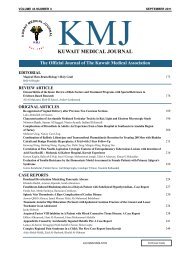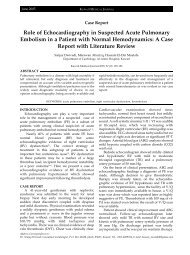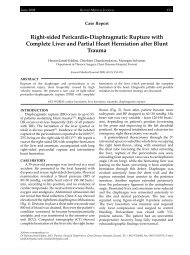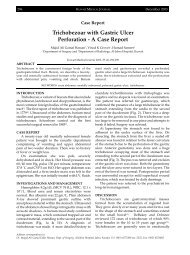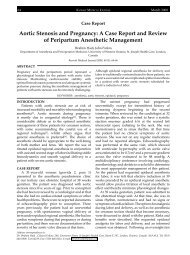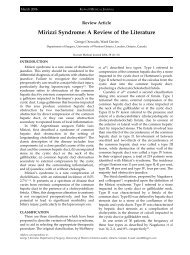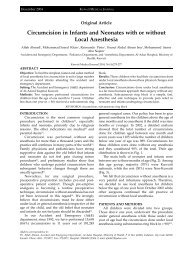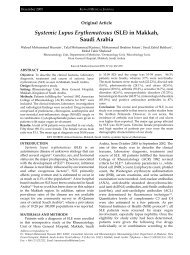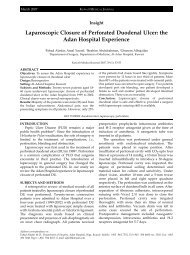Vol 44 # 2 June 2012 - Kma.org.kw
Vol 44 # 2 June 2012 - Kma.org.kw
Vol 44 # 2 June 2012 - Kma.org.kw
Create successful ePaper yourself
Turn your PDF publications into a flip-book with our unique Google optimized e-Paper software.
<strong>June</strong> <strong>2012</strong><br />
students experience lower levels of stress as compared<br />
to males. In transition periods an elevation of stress<br />
level among female students during the first study<br />
year, and an increase of male students’ stress starting<br />
later during the preclinical period with the overload of<br />
information was noted in another study [10] . Although<br />
we did not find any significant gender difference for<br />
anxiety contrary to recent findings reporting female<br />
dominance, we found that male students were more<br />
depressed in all assessments.<br />
Cost of medical education is an important challenge<br />
especially for students from lower income families [26] .<br />
Economic problems were also noted in recent studies as<br />
the sources of stress in medical students [9,15] . Similarly,<br />
students who reported lower family income were<br />
significantly more anxious in A1 and more depressed<br />
in A1 and A2 in our study. But in A3 students seemed<br />
to be adapted to the economic conditions and their<br />
HADS scores were like the higher income group.<br />
Informed career selection is a suggested process for<br />
a mature, realistic and objective decision making [14,27] .<br />
Again our results replicates this suggestion pointing to<br />
the importance of informed decision making. Students<br />
who got no information about medical education and<br />
working conditions were more anxious in A2 and A3.<br />
In addition, especially, students who were not informed<br />
about working conditions were more depressed in A1<br />
and A2. Of course, it is important to keep in mind the<br />
effect of desire for medical career [18] . Besides, there are<br />
many contributing factors in decision process such<br />
as economic factors, expectations, parental wishes or<br />
other external influences etc [14,27,28] . Students’ reasons<br />
for medical career selection and future expectations<br />
seems to not have an effect on anxiety scores. External<br />
influences in decision process and expecting better<br />
economic conditions made students more depressed,<br />
especially, in A1 and A2. It may be attributed to the<br />
unwillingness and unmet expectations resulting from<br />
uninformed decision making.<br />
In addition to medical education medical students<br />
face many personal and societal challenges [4] .<br />
According to a study, family problems, interpersonal<br />
problems, economic problems, career plans, physical<br />
health, medical lecture workload and poor academic<br />
performance increase the pressure on medical<br />
students [15] . The most common sources of stress were<br />
noted to be related to academic and psychosocial<br />
concerns. The most important and severe sources of<br />
stress were staying in hostel, high parental expectations,<br />
vastness of syllabus, tests / exams, lack of time and<br />
facilities for entertainment etc [17] . Stressful personal<br />
life events such as illness or death of family members<br />
etc were found to be related to students’ wellbeing [5] .<br />
The main components of the students’ lives are their<br />
education, their families and their intimate partners and<br />
the presence of a negative event was found to increase<br />
the risk of having a mental problem [25] . In a recent<br />
KUWAIT MEDICAL JOURNAL 110<br />
study, students who experienced negative personal life<br />
events did not have a higher frequency of burnout than<br />
students who did not experience a negative personal<br />
life event. But personal characteristics, learning<br />
environment and personal life events were all found<br />
to be independently related to student’s burnout [4] .<br />
The number of negative personal life events in the<br />
last 12 months were also in correlation with the risk<br />
of burnout [5] . Those who had suffered any negative<br />
life events, such as failing an examination, death of a<br />
parent and other social burdens, were more depressed<br />
than those who had experienced positive life events [11] .<br />
When students were asked about the most distressing<br />
event in the last year, nearly half of them reported<br />
educational problems such as failing the class or failure<br />
to study in a faculty of their preference, loss of a family<br />
member or breaking up with their partner because<br />
of an infidelity or a quarrel [25] . Moreover, the level of<br />
dissatisfaction in social activities was associated with<br />
all psychological test scores for medical students. In<br />
addition, romantic relationships and anxiety about<br />
the future were determined as being the other factors<br />
associated with psychological test scores [8] . Medical<br />
students in Hong Kong reported a higher level of<br />
psychological morbidity with concerns including<br />
examinations, stress, career, adjusting to the new<br />
medical curriculum and commitment to the course [12] .<br />
Loss of relative was also one of the predictors of<br />
depression and anxiety among students. Students who<br />
had lost a close relative in last one year were 3.4 times<br />
more likely to be depressed and suffer from anxiety<br />
as compared to those who did not experience such a<br />
loss [16] . Similarly, in this study we found that students<br />
who faced an important problem in the past six months<br />
were significantly more anxious and more depressed<br />
in A2 and A3. But when it comes to the contributing<br />
factors although problems about education and school<br />
were the most reported, according to HADS scores these<br />
were the least factors worsening their well-being. With<br />
these results we could not claim that education related<br />
factors were significant contributing factors for anxiety<br />
and depression of medical students as noted before [15] .<br />
A large proportion of students in both clinical and basic<br />
science have potential psychological problems mainly<br />
related to academics and psychosocial concerns [17] .<br />
High academic achievement was noted to have a<br />
positive effect on the mental health of students [25] . There<br />
are both positive and negative correlations between<br />
academic achievement and anxiety and depression in<br />
medical students, regarding differing levels of severity<br />
of anxiety or depression [15] . Similarly, problems related<br />
to school in the past six months were mentioned<br />
mostly but the HADS scores were in contrast in this<br />
study. These results maybe attributed to different<br />
factors unique to our faculty. In the faculty of Medicine<br />
in Meram, every year, two-third of the all students in<br />
the first three years got scores higher than 80 points out


